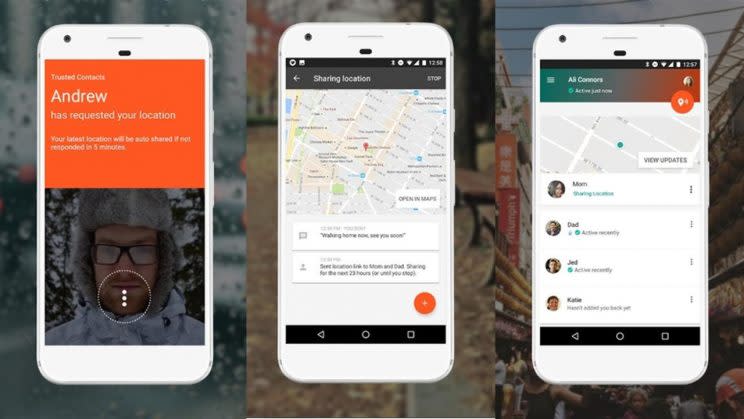Google's Trusted Contacts app an example of Privacy by Design

You can now turn your loved ones’ smartphones into emergency response beacons thanks to Google’s new application Trusted Contacts.
The Android app, released this week via the Google Play store, allows you to designate “trusted contacts” that, in the event of a crisis, can ping you and request your status and whereabouts. You get five minutes to approve or deny the request, which appears as a full screen pop-up. If you don’t answer, your location will be shared automatically.
It also has a follow along feature, a virtual companion of sorts that allows you to share your walk or commute home with one of your trusted contacts so they can ensure you make it to your final destination. Once you’re there, you can end sharing.
In an era of location-based apps keeping tabs on your movements, Dr. Ann Cavoukian, executive director of Ryerson’s Privacy and Big Data Institute and former privacy commissioner of Ontario, says the app is a step in the right direction.
“Privacy – as a default – is embedded into the system,” she says. “You want to have a personal safety app that only gives your location to trusted parties (and) you decide who they are.”
As one of the chief architects behind the Privacy by Design movement, Cavoukian has been an outspoken advocate for proactive privacy measures in technology and data as opposed to reactive. She also champions respect for the privacy of users. She points out that the need for positive consent becomes especially critical when it comes to sensitive data like a personal exact location.
But despite the user opt-in approach, there are some concerns, says Patrick Hung, associate professor of information security at the University of Ontario Institute of Technology.
“There is no doubt the tracking function via GPS is very attractive, especially for parental control on children and elderly people care in an emergency situation,” he says. But what about in cases where you have a falling out with one of your trusted persons? What about the archetypal loved-one-turned-stalker? The overbearing parents keeping tabs on your position? Or what happens if a trusted persons own smartphone is stolen, posits Hung.
That, he explains, will inject a human element into an otherwise automated system requiring users to “keep track of relationships” and be sure to adjust the permissions should those relationships change.
“A trusted person could even track my behaviour by using big data analytics tools with social media data,” he says pointing to the down side. And of course, the obvious concern: hackers. “Data breach is definitely a serious concern.”
But Cavoukian argues that in today’s environment, data breaches are an omnipresent concern. She says users are more apt to use the app because of its approach to controlling who gets that info.
“They’re setting a really high bar in terms of privacy,” she says. “And for your location, that’s exactly how it should be and that’s why I’m applauding them.”

 Yahoo Finance
Yahoo Finance 